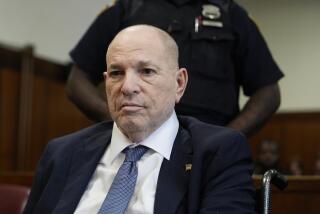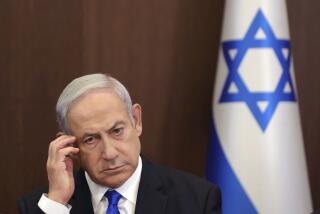‘Heart No. 1’ on the Mend in Moscow
- Share via
MOSCOW — President Boris N. Yeltsin battled back into consciousness Tuesday after surgeons stopped his heart for 68 minutes to stitch five bypasses around the damaged organ in hopes of restoring his once-legendary vigor.
Visibly exhausted after the seven-hour operation on what has come to be known in Russia as “Heart No. 1,” chief surgeon Dr. Renat Akchurin described the operation as “sufficiently successful” while cautioning colleagues to be on guard for any hint of complications in the sensitive postoperative period.
The most high-profile world leader ever to undergo open heart surgery while in office, Yeltsin wagered his life in a bid to overcome the debilitating effects of three heart attacks and recover the strength needed to continue guiding this troubled superpower.
None of the 12 Russian physicians involved in the tense operation would risk a prognosis after the procedure that seemingly stopped hearts across the country. But relief was evident everywhere from the streets to the stock market, which rose 2% upon news that the surgery went off without major medical complications or political power grabs.
Akchurin’s mentor, U.S. heart surgery pioneer Dr. Michael DeBakey, gave a more effusive account than Akchurin of the procedure he watched via a video monitor with other foreign colleagues at the Moscow Cardiological Center, where the operation took place.
“I think they were all very, very pleased with the way it went. The Russian doctors were all very exuberant about it,” DeBakey said after the operation, which he deemed “a complete success.”
DeBakey predicted that Yeltsin will recover swiftly and soon be back to work in the Kremlin with a new lease on life.
Akchurin told journalists at a hospital news conference only an hour after completing the operation that he had tried to put out of his mind that he was operating on a head of state.
“Every time you enter an operating room, you feel a colossal responsibility for any patient, because he is entrusted to you,” said the soft-spoken surgeon, still in green scrubs. “I tried to forget that this is the president of Russia.”
Akchurin said he suspected that Yeltsin too was nervous but that the president sought to ease the pressure on those around him.
“I could see that he realized that any expression of his nervous state could affect the surgeons, so he was in good humor and made jokes,” Akchurin said about the minutes before the operation.
Yeltsin’s wife, Naina, was kept waiting outside the 65-year-old leader’s intensive-care unit throughout the operation and for at least the first five hours of recovery. With red-rimmed eyes and quivering voice, she told a Russian Public Television cameraman allowed into the waiting area that she was profoundly worried and had not been allowed to see her husband.
“Please, God, let everything be all right,” she pleaded, thanking the people of Russia for their thoughts and prayers.
Yeltsin emerged from the anesthesia at 6:45 p.m., less than five hours after the operation ended, presidential spokesman Sergei V. Yastrzhembsky told independent NTV. He said he had been informed by the cardiology center’s director, Yevgeny I. Chazov, that Yeltsin’s eyes opened as the anesthesia wore off.
The ailing president had held on to his powers until the final minute before the operation, signing a decree designating Prime Minister Viktor S. Chernomyrdin as acting head of state at 7 a.m. Moscow time--just before the surgery started--and issuing three final orders on regional personnel matters before being rendered unconscious.
Early today, Yeltsin signed a decree taking back key presidential duties, including control of the briefcase carrying an encoding device for launching nuclear missiles.
Before the surgery, Yeltsin had taped a radio address to the Russian people that was replete with emotion and left many listeners with an eerie sense that he might be saying goodbye.
“Compassion and kind words are sometimes more important to a man than any medicine,” he told fellow Russians in gratitude for their good wishes.
Avowing full trust in Chernomyrdin and his other Kremlin lieutenants as “reliable and tested people,” Yeltsin said they would have to shoulder a huge burden in the coming days.
“You must know that all that I did, am doing and will do--all this is for the sake of Russia, for the sake of making your lives prosperous and dignified,” Yeltsin said. “It is particularly important to me to let you know this today.”
Akchurin and DeBakey both indicated that Yeltsin would be freed early today from the artificial breathing apparatus involving a tube inserted in his throat, once doctors were certain he had fully recovered consciousness and could breathe on his own.
Yeltsin’s heart resumed beating on its own soon after the bypasses were completed, and his doctors pointed to this as an encouraging sign for successful recovery.
Akchurin declined to characterize his patient’s condition except to say that Yeltsin was stable.
DeBakey, three other U.S. specialists and two German surgeons watched the last three hours of the operation on a monitor nearby but were never asked for advice.
DeBakey praised Akchurin’s technique, immodestly adding that “I may be biased, though, since he was my student and I trained him.”
The president’s doctors had said prior to the surgery that three or four bypasses, or grafting of blood vessels around blocked coronary arteries, would be needed. But once at work, the surgeons made five grafts to ensure a better supply of blood to the heart.
Yeltsin, who had suffered three mild heart attacks in little more than a year, was afflicted with myocardial ischemia, in which the blood flow to the heart is hindered. The bypass operation borrowed the mammary artery from his chest for the main graft and a segment of vein from a lower leg to make the other four detours around the organ damage.
The recovery period will depend on how soon Yeltsin’s heart and lungs resume functioning reliably, Akchurin said, adding that he might be able to make a more detailed prognosis in five or six days.
Although the critical period for most heart bypass patients is considered to be roughly the first 72 hours, Russian physicians are more conservative than their Western counterparts, and Russian superstition dictates against making predictions about health matters.
DeBakey exuded more confidence, noting that he had told Yeltsin that all would be fine and that the president would be back to work in no time.
“I feel gratified having been of service and having been right in what I had predicted,” said the famed U.S. surgeon, who advised a six- to 10-week delay in the operation during a September visit to give internal bleeding that Yeltsin was then experiencing time to heal and the heart a chance to recover from a late-June attack.
Yeltsin is expected to remain hospitalized for about two weeks and then probably be transferred to a sanatorium for as much as two months’ rest.
More to Read
Sign up for Essential California
The most important California stories and recommendations in your inbox every morning.
You may occasionally receive promotional content from the Los Angeles Times.











